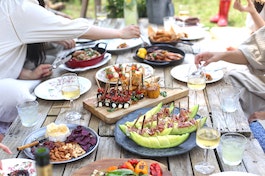Being Liberal in Our Homes
- JOHN A. CUDDEBACK
"…the liberal man will both give and spend the right amounts and on the right objects, alike in small things and in great."
Aristotle, Nicomachean Ethics
 It is remarkable how one word can have such different meanings. The same word can point to something to which we have antipathy, and also point to something profoundly beautiful.
It is remarkable how one word can have such different meanings. The same word can point to something to which we have antipathy, and also point to something profoundly beautiful.
In Aristotle’s sense of the term, we need liberality in our homes. Actually, we need it first in our souls. Home is a great place to develop and practice it.
In short, liberality names a virtue, and thus a firm disposition of soul, of giving and taking wealth well. One can give away too much while taking (i.e., making or earning) too little. This he calls prodigality, a failure indeed but one much less common than the opposing failure. Meanness is giving away and sharing too little while focusing on making or earning too much. This Aristotle deems to be prevalent.
“Therefore the liberal man… will give for the sake of the noble, and rightly; for he will give to the right people, the right amounts, and at the right time, with all the other qualifications that accompany right giving, and that too with pleasure… for it is the nature of a liberal man not to look to himself.”
What a beautiful thing! Aristotle's sketches of the various virtues bring home to us the truth that to be virtuous really is to thrive, and to be happy. I love to picture myself being a liberal man and to imagine what it would feel like. I imagine too the joy it would bring to those around me.
Home, as usual, is the place to start. Our home can be a bastion, or at least a foothold for liberality. Hospitality can be a major expression. We might say: as for me and my house, we will be lavish in how we take care of you — you, whoever you are, when we are blessed to have you as guest. There are then so many other ways too the liberality, the generosity of our home can be lavished on others.
We might say: as for me and my house, we will be lavish in how we take care of you — you, whoever you are, when we are blessed to have you as guest.
Aristotle proceeds to point out that it not most about the amount given. The poor too can be truly liberal. It is most about a large generosity of soul, a disposition formed and expressed by ongoing practice; a disposition incarnated in material things, small things and great.
Liberality: the very name speaks of a deep inner freedom — the freedom of seeing things, and people, for their real worth, and the freedom of acting according to this truth.
As with all virtues, liberality does not simply appear out of nowhere. It is the fruit of thoughtful cultivation. There is a great blessing in simply learning what the virtues are. Such knowledge can inspire and direct our efforts, starting at home.
❧
Aristotle (384-322 B.C.), student of Plato, tutor of Alexander the Great, has been considered by many to be the greatest ancient philosopher. The Nicomachean Ethics is his major ethical work.
 This is Meaghen Gonzalez, Editor of CERC. I hope you appreciated this piece. We curate these articles especially for believers like you.
This is Meaghen Gonzalez, Editor of CERC. I hope you appreciated this piece. We curate these articles especially for believers like you.
Please show your appreciation by making a $3 donation. CERC is entirely reader supported.

Acknowledgement
 John A. Cuddeback. "Being Liberal in Our Homes." LifeCraft (September 29, 2021).
John A. Cuddeback. "Being Liberal in Our Homes." LifeCraft (September 29, 2021).
Reprinted with permission from the author, John A. Cuddeback. Image by Askar Abayev from Pexels




